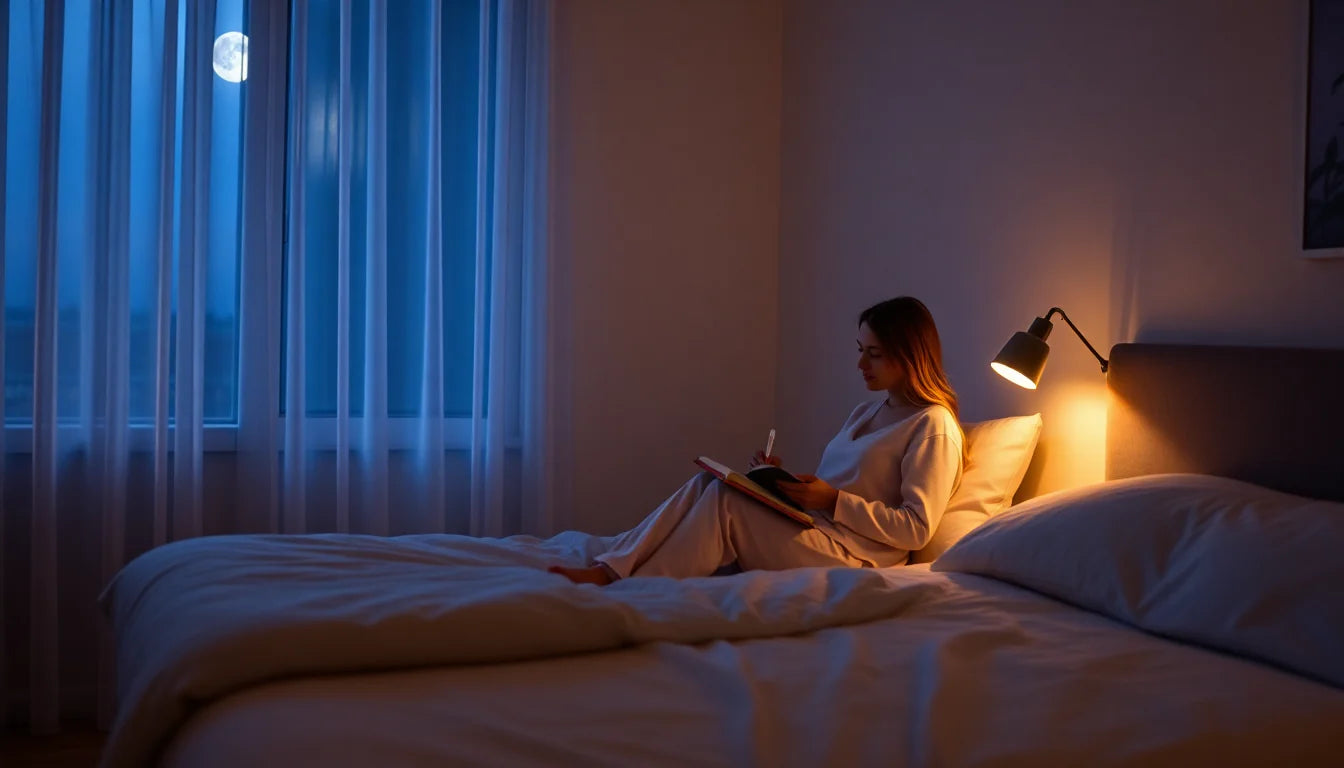Have you ever crawled into bed, exhausted, only to find your mind racing a mile a minute? You’re not alone. In a world that rarely slows down, winding down at night can feel nearly impossible. But what if you could press pause—every evening—and give your body and mind the closure it needs?
Creating a nighttime routine that actually works isn’t about copying someone else’s aesthetic on TikTok or lighting every candle you own. It’s about building a set of habits that meet you exactly where you are—and guide you gently into rest.
Let’s walk through how you can design an evening routine that feels like a sigh of relief, not another thing on your to-do list.In this comprehensive guide, we'll explore the science behind why a night routine matters, walk through a step-by-step process for building a personalized routine, and share expert tips and strategies to help you stick to it.
Why a Nighttime Routine Matters More Than You Think
You might be tempted to crash in front of your phone and scroll until sleep takes over. But the hours before bed hold powerful potential for healing and peace.
According to the Sleep Foundation, adults who follow a consistent bedtime routine tend to fall asleep faster, enjoy deeper sleep, and wake up feeling more refreshed. Your brain loves patterns—it craves cues that signal it’s time to unwind.
A nighttime routine doesn’t just help you sleep better. It can reduce anxiety, quiet overthinking, and create a much-needed boundary between your busy day and restful night.
-
Improve Sleep Quality: Repeating calming activities each night trains your brain to relax, helping you fall asleep faster and wake up more refreshed.
-
Reduce Stress and Anxiety: Evening routines ease mental overload. Gentle rituals like journaling or yoga help calm your nerves and quiet a racing mind.
-
Boost Mental and Emotional Well-Being: Creating structure at night fosters emotional stability, offering peace, control, and a moment to reconnect with yourself.
- Enhance Productivity and Focus: Better sleep means sharper mornings. A soothing nighttime routine fuels clearer thinking and stronger focus the next day.

Step-by-Step: Building a Night Routine That Feels Right for You
Now that we've explored the many benefits of a consistent nighttime routine, let's dive into the process of creating one that aligns with your unique needs and preferences. Remember, there's no one-size-fits-all approach – the key is to experiment and find what works best for you.
Step 1: Assess Your Current Nighttime Habits
The first step in building a better nighttime routine is to take an honest look at your current evening habits. Consider the following questions:
-
What time do you typically go to bed and wake up?
-
How long does it take you to fall asleep?
-
Do you experience any sleep disturbances or challenges throughout the night?
-
What activities do you engage in during the evening hours?
-
How do you feel when you wake up in the morning?
Jotting down your answers to these questions can help you identify areas of your nighttime routine that may need improvement, as well as highlight the aspects that are already working well for you.
Step 2: Determine Your Ideal Nighttime Routine
With a clear understanding of your current nighttime habits, it's time to envision your ideal evening routine. Consider the following elements:
-
Bedtime and wake-up times: Aim for a consistent sleep schedule that allows for 7-9 hours of quality sleep per night.
-
Winding-down activities: Choose a sequence of calming, restorative activities to help you transition from the day (e.g., light stretching, reading, journaling, meditation).
-
Relaxation techniques: Incorporate practices that help you manage stress and promote a sense of calm (e.g., deep breathing, progressive muscle relaxation, visualization).
-
Screen-free time: Establish a screen-free period before bed to minimize the disruptive effects of blue light on your sleep.
-
Bedtime rituals: Consider adding small, meaningful rituals to your routine that signal to your brain that it's time to sleep (e.g., sipping herbal tea, lighting a candle, setting out your clothes for the next day).
Tip: Use a bedtime journal to brain-dump lingering thoughts or write a short gratitude list.
Step 3: Gradually Implement Your New Routine
Once you've identified the key elements of your ideal nighttime routine, it's time to start putting it into practice. However, it's important to note that building a new habit takes time and consistency, so it's best to implement your routine gradually.
Begin by focusing on one or two new habits at a time, and gradually add more elements as they become ingrained in your daily life. This will help you avoid feeling overwhelmed or frustrated, and increase the likelihood that your new nighttime routine will stick.
As you implement your new routine, be mindful of any obstacles or challenges that arise, and be willing to make adjustments as needed. It's also helpful to track your progress and celebrate small wins along the way, as this can help reinforce the positive changes you're making.

Customizing Your Night Routine for Better Sleep and Mental Health
While there are some universal best practices for a healthy nighttime routine, the reality is that what works for one person may not work for another. That's why it's important to tailor your evening ritual to your unique needs and preferences.
Here are some tips for customizing your nighttime routine to support better sleep and mental health:
Prioritize Relaxation and Stress Management
If you struggle with anxiety, racing thoughts, or difficulty winding down in the evenings, consider incorporating more relaxation-focused activities into your routine. This could include practices like:
-
Gentle yoga or stretching
-
Meditation or deep breathing exercises
-
Journaling or free-form writing
-
Listening to calming music or nature sounds
-
Taking a warm bath or using essential oils
The key is to find activities that help you transition from the mental and physical stimulation of the day into a state of deep relaxation and calm.
Optimize Your Sleep Environment
Your sleep environment plays a crucial role in the quality of your sleep, so it's important to create a space that is conducive to rest and relaxation. Consider the following elements:
-
Ensure your bedroom is cool, dark, and quiet, with minimal light and noise disruptions.
-
Use blackout curtains or an eye mask to block out any external light.
-
Invest in a comfortable, supportive mattress and pillows.
-
Experiment with white noise or soothing sounds to mask disruptive noises.
-
Avoid using your bed for activities other than sleep and sex, so your brain associates it with rest.
By creating a sleep-friendly environment, you can help signal to your body that it's time to wind down and prepare for a restful night's sleep.
Incorporate Mindfulness and Gratitude
In addition to relaxation-focused activities, incorporating mindfulness and gratitude practices into your nighttime routine can also have a profound impact on your mental and emotional well-being.
Consider setting aside a few minutes each evening to reflect on the day, express gratitude for the positive moments, and let go of any lingering worries or stressors. This can help shift your mindset from one of stress and anxiety to one of calm and appreciation.
You might also try a brief meditation or mindfulness exercise, such as a body scan or loving-kindness meditation, to further cultivate a sense of inner peace and presence.
Experiment with Chronotherapy
Chronotherapy is the practice of aligning your daily activities, including your sleep-wake cycle, with your body's natural circadian rhythms. This can be particularly beneficial for individuals who struggle with sleep disorders or mental health challenges.
Some examples of chronotherapy-inspired nighttime routine elements include:
-
Exposure to bright light in the morning and dim light in the evening
-
Engaging in physical activity earlier in the day, rather than right before bed
-
Avoiding caffeine and heavy meals in the late afternoon and evening
-
Sticking to a consistent sleep schedule, even on weekends
By synchronizing your nighttime routine with your body's natural rhythms, you can optimize your sleep quality and overall well-being.
Common Night Routine Mistakes That Sabotage Your Sleep
While a well-designed nighttime routine can work wonders for your sleep and mental health, there are also some common mistakes that can undermine your efforts. Here are a few to watch out for:
Inconsistent Bedtime and Wake-Up Times
One of the most critical elements of a successful nighttime routine is consistency. Varying your bedtime and wake-up times, even on weekends, can disrupt your body's natural circadian rhythms and make it harder to fall asleep and stay asleep.
Aim to go to bed and wake up at the same time each day, even if it means adjusting your schedule on the weekends. This consistency will help reinforce your body's sleep-wake cycle and make it easier to fall asleep at night.
Engaging in Stimulating Activities Before Bed
It's important to avoid engaging in activities that are mentally or physically stimulating in the hours leading up to bedtime. This includes things like:
-
Watching TV, using your phone or computer
-
Engaging in intense exercise
-
Paying bills or doing work-related tasks
-
Consuming caffeine or alcohol
These types of activities can increase alertness and make it harder to wind down and fall asleep. Instead, focus on calming, relaxing activities that help prepare your body and mind for sleep.
Neglecting Stress Management
Unmanaged stress and anxiety can be a major roadblock to a restful night's sleep. If you find yourself lying awake at night, worrying about the day's events or stressing about the future, it's a sign that you need to incorporate more stress management into your nighttime routine.
Make time for activities that help you process and release stress, such as journaling, meditation, or gentle yoga. You might also try relaxation techniques like deep breathing or progressive muscle relaxation to calm your mind and body.
Ignoring Your Sleep Environment
As mentioned earlier, your sleep environment plays a crucial role in the quality of your sleep. If your bedroom is too bright, too noisy, or too hot or cold, it can disrupt your sleep and make it harder to fall and stay asleep.
Take the time to optimize your sleep environment by ensuring it's dark, cool, and quiet. Consider using blackout curtains, a white noise machine, or a fan to create the ideal conditions for restful sleep.
Failing to Establish a Consistent Routine
Finally, one of the most common mistakes people make when trying to build a nighttime routine is a lack of consistency. It takes time and effort to turn a series of activities into a true habit, and it's easy to get derailed by unexpected events or changes in your schedule.
To combat this, try to be as consistent as possible with your nighttime routine, even on weekends or when you're traveling. Stick to the same sequence of activities, and be patient with yourself as you work to make it a lasting habit.
Sample Nighttime Routine Schedules You Can Try Tonight
If you're feeling overwhelmed by the prospect of creating a new nighttime routine from scratch, here are a few sample schedules you can use as a starting point:

Relaxation-Focused Routine
-
7:00 PM: Begin winding down, turn off screens
-
7:30 PM: Light stretching or gentle yoga
-
8:00 PM: Journaling or free-writing
-
8:30 PM: Meditation or deep breathing exercises
-
9:00 PM: Prepare for bed (brush teeth, wash face, etc.)
-
9:15 PM: Read a book or listen to calming music
-
10:00 PM: Lights out, sleep
Productivity-Oriented Routine
-
6:30 PM: Finish up any remaining work tasks
-
7:00 PM: Tidy up workspace, prepare for the next day
-
7:30 PM: Light exercise or outdoor activity
-
8:00 PM: Prepare and enjoy a healthy, nourishing meal
-
8:45 PM: Review daily planner, set intentions for tomorrow
-
9:15 PM: Engage in a relaxing activity (e.g., take a bath, listen to a podcast)
-
10:00 PM: Lights out, sleep
Mindfulness-Focused Routine
-
8:00 PM: Begin winding down, turn off screens
-
8:15 PM: Gratitude practice or journaling
-
8:45 PM: Gentle stretching or restorative yoga
-
9:15 PM: Guided meditation or body scan
-
9:45 PM: Prepare for bed (brush teeth, wash face, etc.)
-
10:00 PM: Read a few pages of an inspirational book
-
10:15 PM: Lights out, sleep
Remember, these are just examples to get you started. The key is to experiment and find a routine that aligns with your unique needs, preferences, and lifestyle. Be patient with yourself, and don't be afraid to make adjustments as you go.
Support Your Routine With Helpful Tools
You don’t need to buy anything fancy, but a few thoughtful tools can help you stay consistent:
-
Sleep masks for total darkness
-
Aromatherapy like lavender or chamomile oil
-
Weighted blankets to soothe the nervous system
-
Journals with nightly prompts
-
Apps like Calm or Insight Timer for guided meditations

Final Thoughts – Start Small, Stay Consistent, Sleep Deeply
The real purpose of a nighttime routine isn’t perfect sleep every night. It’s giving your mind, body, and heart a safe space to land after a long day. Some nights you’ll journal. Some nights you’ll forget. That’s okay.
Start small. Choose what feels good. Build from there.
Because you deserve rest that heals—not just sleep that passes time.
Tonight, could be the night it all changes.
A Calming Evening Journal Guide You’ll Love
Looking to unwind after a long day or sleep with a clearer mind? These soothing evening journaling tips and prompts are perfect for helping you slow down, release stress, and gently prepare for rest.



